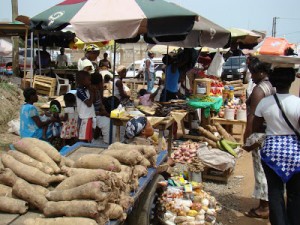Ghana’s informal economy has significant work deficit – Research
 A research conducted by the Trades Union Congress (TUC) and the Ghana Employers’ Association (GEA) says Ghana’s informal economy is currently characterised by a significant decent work deficit.
A research conducted by the Trades Union Congress (TUC) and the Ghana Employers’ Association (GEA) says Ghana’s informal economy is currently characterised by a significant decent work deficit.
Lack of representation as well as inadequate social protection, employment and income insecurity are also common features of the Ghanaian informal sector, which employs about 88 per cent of the working population.
Mrs Mary Akosua Karimu, a Research Officer at the TUC Training College, speaking to the media in Accra, said based on the above limitations, the TUC and GEA with the support from the Business and Advocacy Fund (BUSAC Fund) conducted a baseline survey on formalising the informal economy.
The survey was piloted on two informal associations – National Association of Beauticians and Hairdressers (NABH) and the Union of Informal Economy Workers Association (UNIWA) based on the statistics from the 2012 and 2013 Ghana Living Standard Survey.
The survey, she said, was to develop a common position paper on how Ghana could proceed in the transition of the informal economy to a formal economy.
Mrs Karimu said the nature and functioning of the informal economy compromised the decent work situation of workers and operators in that segment of the economy.
She said an important step towards addressing the significant decent work deficits in the informal economy was formalising that economy as stated in national tripartite discussions in recent times.
She said dedicated institutions mandated to facilitate the formalising process was a necessary requirement for the transition from informal to formality.
“There is the need to strengthen the defunct National Informal Economy Committee to be included on the tripartite committee to ensure a fair representation.
Mr Karimu called for capacity development for leadership in the informal economy to address their operational limitations.
Mr Charles Asante, a Research Officer at the GEA, said the overall goal of the survey was to develop a roadmap for the transitioning of informal economies to formal economies using the International Labour Organisation recommendation 204 as a guide.
He said though some informal economy operators paid tax, the notion among the populace was that they were not, and formalising them was an opportunity for the informal economy operators to be captured properly in the tax bracket.
Source: GNA
